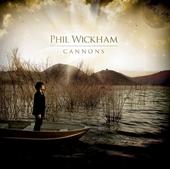“Writing about music is like dancing about architecture.â€
No one knows who actually said it. This witty proclamation has been attributed to actors, authors, comedians, jazz musicians and yes, an architect. Regardless of who deserves credit, it makes sense and with that sentiment in mind I apologize for what you are about to read and ask you to skip to the part where you actually listen to the record. If you are like me, you will feel more like dancing than writing.
Mesmerizing. Atmospheric. Captivating. Stunning. Soaring. Lavish. Poetic.
Phil Wickham’s music has been called every flowery adjective in the thesaurus and some that may have even been made up. And while they are often accurate descriptors they are at the same time distracting. When hearing these buzz words it’s too easy to lump an artist into a meaningless equation consisting of two musical references, a vague genre title and a classic predecessor. Welcome to missing the point.
The point is that Wickham is at his core a humble and sincere artist who writes songs and worships God using the medium of music. It is with that brush that he paints images of a loving and creative God across the canvases of listeners’ hearts and minds. Although the evidence of this gift was apparent on Wickham’s previous release as well as his self released independent record, it has never been clearer and more developed than on the twelve tracks off his sophomore Simple Records album Cannons.
When naming the album Wickham was trying to find a metaphor for the brilliance and magnitude of creation. He needed a word that has not been overused and therefore gives listeners pause and compels them to consider the wonder of the world around them.
It’s falling from the clouds, A strange and lovely sound
I hear it in the thunder and rain, It’s ringing in the skies
Like cannons in the night, The music of the universe plays
“If people just took the time to look at the trees outside, the rain that’s falling, these bodies that are walking around… life is not just evidence that God exists, but more like the world acting as worship leader, inspiring us, but much louder than any concert you could ever imagine,†Wickham states. “Ultimately, I hope that by listening to these songs people will find the same inspiration to look outside of themselves and their circumstance to the world around them and truly worship God.â€
For Wickham the desire he has for his albums and live show is always to lead people into worship. On Cannons he accomplishes this with a marked sonic shift and an added sense of urgency. Album opener “Must I Wait,†is a clear example of both with its driving tempo and use of layered synthesizers in place of the lush string arrangements of his self-titled debut.
“I think this last year and a half on the road has taught me a lot about who I want to be as an artist. And more than anything I really thought about the live show - there were moments touring where I would say to myself I wish I had this kind of song to play right now. So with Cannons I set out to work all of that experience into the record.â€
“True Love†is one of those songs that Wickham wishes that he had with him over the past few years. The song is a classically bold lyrical challenge in the vein of Keith Green and others from the Jesus Movement era. The lyric offers an invitation to listeners to listen to the story of the Gospel and in the end a plea and a challenge.
Come close listen to the story
about a love more faithful than the morning…
---
Search your hearts you know you can’t deny it
Lose your life just so you can find it…
“I don’t ever want to leave the stage without giving people something to chew on, something to respond to. The most important question is ‘what are you going to do with Jesus?’â€
Ask Wickham for the story behind Cannons and he’ll balk and say their really isn’t one story. He’s right and modest, there isn’t one – there are twelve. Twelve stories and one theme: open your eyes and look up.
Phil Wickham’s songs connect. He asks the right questions and he gives voice and words to our response. The songs speak to the heart of our experience, our relationship with God – and with that said, I’m finished dancing about architecture.
